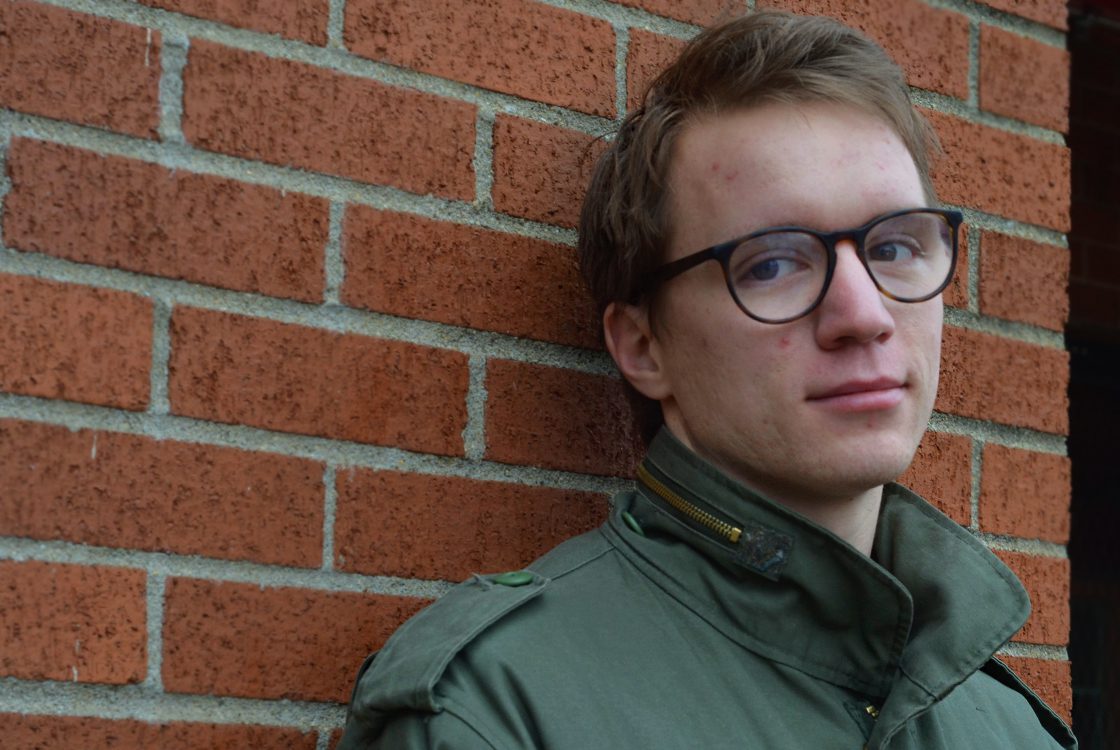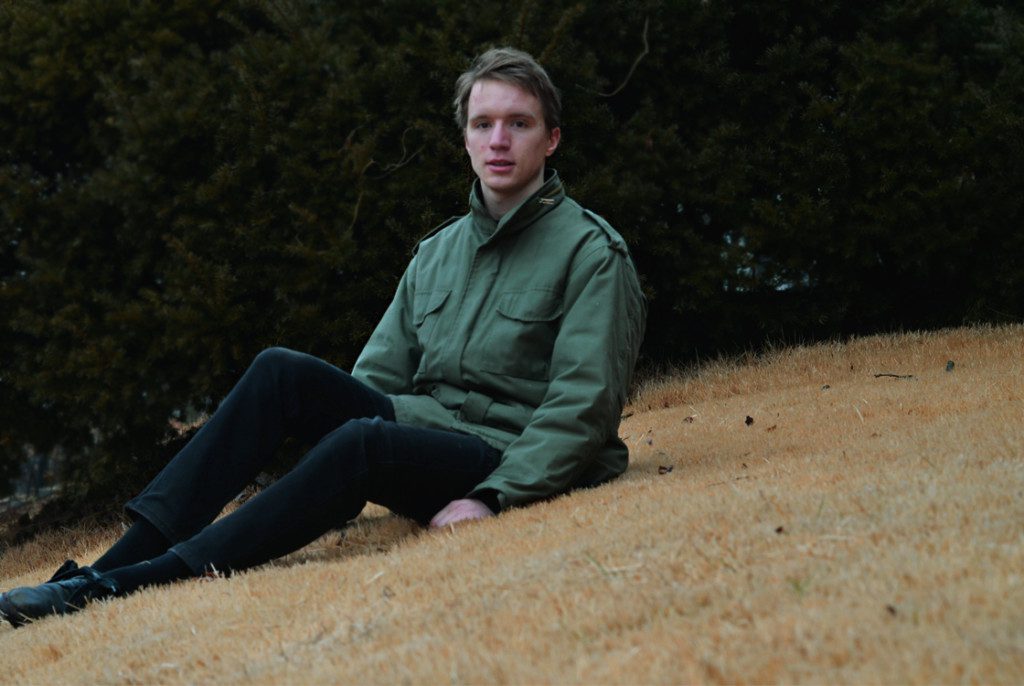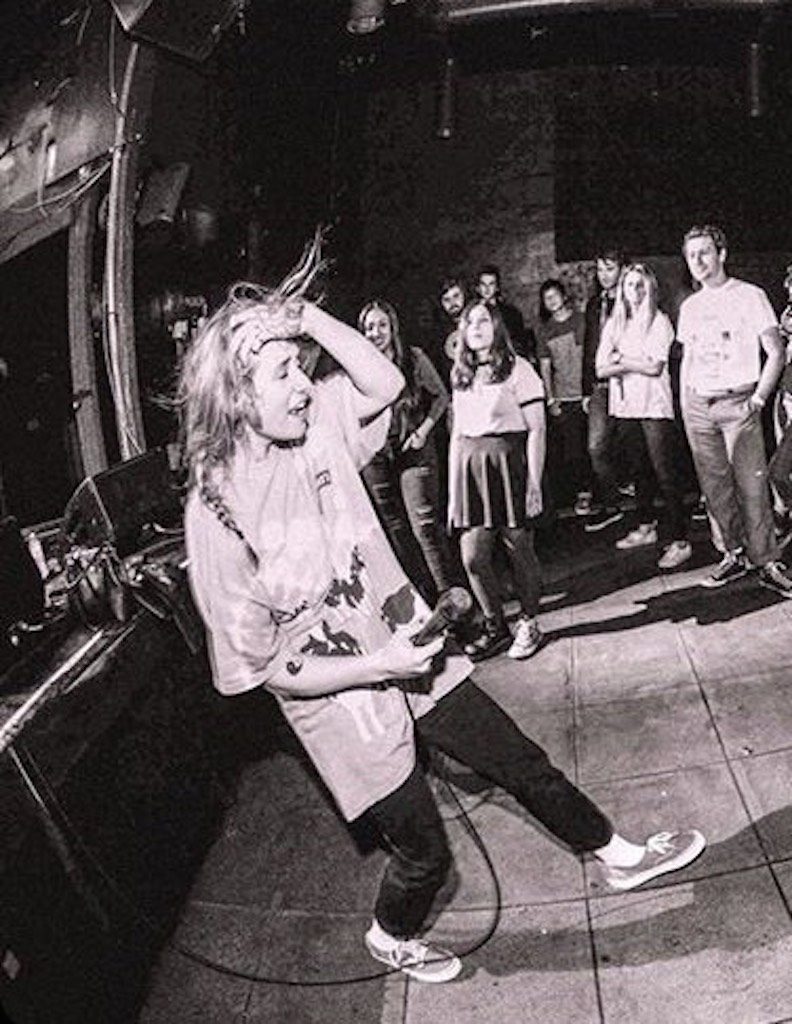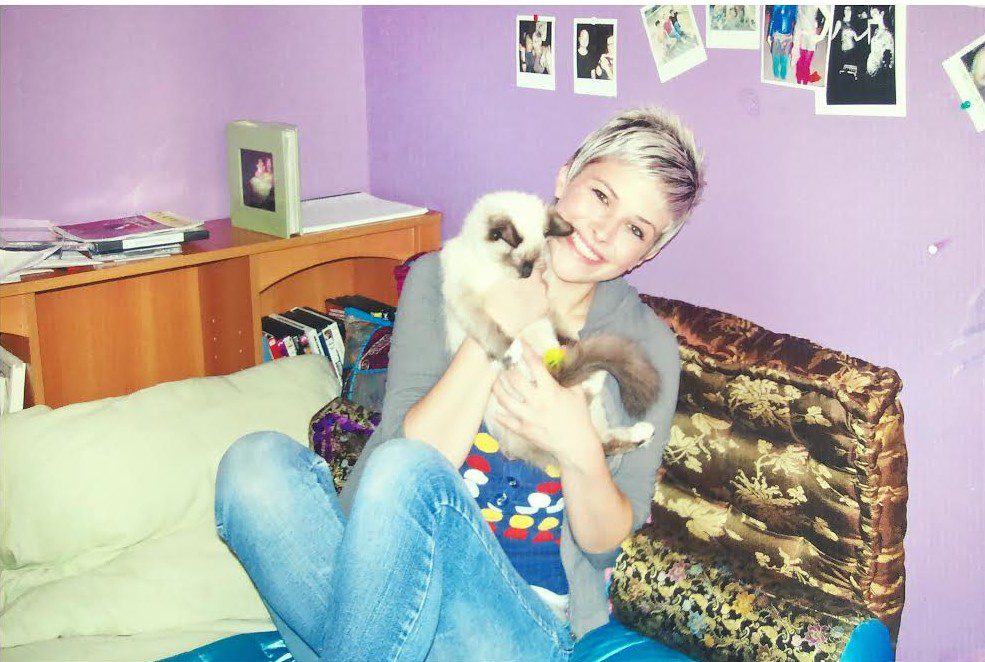
“This is a weird time,” Alex Paquet tells me as we sit down over coffee to talk about his musical project, Field Sleeper. “I’m not usually this bright of a person. There was a very long time – a good year and a half – where I was ultra-sensorially attentive and very, very calm. And it’s still all bursting out right now.”
I feel lucky to have caught Paquet during this period of his life. Throughout our interview, his thoughts, interests, and experiences really do seem like they are bursting out; though I try to wrap up the interview after 50 minutes, we keep talking long after, trading favorite contemporary artists, theory, and installations. We laugh over a picture I took at the Columbus Museum of Art, at an exhibit that Paquet found particularly moving. The photo is of a tag, written on by a museum passer-by, which reads: “I don’t often view creative professional men as creative types, so it’s nice to see a stern man softly.” Paquet says that he often feels stern-er than most, but when I apologize for keeping him so long, he reassures me that he’s happy to have made a new friend, which doesn’t feel stern at all. We part ways in the rain; Paquet catches the bus to get to a nail appointment, and I take a damp walk to the library, Field Sleeper’s upcoming record streaming through my ear buds.
That record, Better Grid, which is slated for release on Scioto Records on March 16, walks the line between stern and soft exceptionally well. A blend of pop, rock, drone, and even jazz-inspired elements, the album highlights Paquet’s gift for musical arrangement. And as compared to previous musical projects, Paquet tells me, Better Grid was “a lot more purposeful, and I was trying to use as few voices as possible in each. I’d also played the songs a lot more – the songs have a lot more personal attachment to me.” In order to give the album a feeling of “performance,” Paquet tracked each component as though he was giving a recital, playing all of the guitar parts at once, and then the vocals, and then the synths, and so on. “I was really inspired by jazz recordings,” he says. “It seemed like there were less tricks – it seemed so clear.” The level of clarity which Paquet perceives in jazz–which he also calls musical efficiency–was integral to the making of Better Grid. Paquet tells me that he focused on giving each component enough space for the audience to fully engage. “A big question that I had to ask a lot,” Paquet says, “is, if this is here, what isn’t someone paying attention to?”
Though Paquet approached the record with intent to strip songs down, handling each sound and “voice” with care, the actual recording process he tells me, “happened by feeling; it wasn’t by design.” Paquet was first approached about recording by Groove U, a music-career specialization program in Columbus, in the fall of 2016. That, Paquet tells me, got him thinking about recording a full album. He recorded the first five songs of what would become Better Grid in February of 2016, during a period of his life where, he tells me, he just wanted to get some songs down to learn more about them. Then, after an East Coast tour in June, Paquet came back to Better Grid, recording four more songs for the project (one song, out of the nine recorded, never made it on the album). “Maybe what the recording can represent is trying to learn what’s really going on with the set of songs,” Paquet says. He calls the period of time spent on Better Grid the “cognitive height” of Field Sleeper. It encompasses “a lot of tours,” he says, “and a lot of time spent making music and thinking about making music.”
After Paquet was done with his recording, the album was mixed by Mike Shiflet, a noise musician and avant-gardist who Paquet calls “the big time.” Shiflet “had a really big impact,” Paquet says, “on how the thing sounds. There are some tracks, like on ‘Shed,’ where the vocals are panned really hard to one side and the guitar is on the opposite – that was all him.”
Now that all of the recording and mixing is over, Paquet says that listening to Better Grid “can honestly calm me down sometimes.” Still, Paquet is conscious of how he wants the project to evolve onstage. “When I was recording it,” he says, “I think I took too much life out of it… Now, I’m trying to think [fusion_builder_container hundred_percent=”yes” overflow=”visible”][fusion_builder_row][fusion_builder_column type=”1_1″ background_position=”left top” background_color=”” border_size=”” border_color=”” border_style=”solid” spacing=”yes” background_image=”” background_repeat=”no-repeat” padding=”” margin_top=”0px” margin_bottom=”0px” class=”” id=”” animation_type=”” animation_speed=”0.3″ animation_direction=”left” hide_on_mobile=”no” center_content=”no” min_height=”none”][about] how much more life I can bring into it, and then I know that if push comes to shove I can rely on whatever it took to make.” Onstage, Paquet plays with a rotating cast of musicians and collaborators, including Felix O’Connor, Seth Daily, Kyle Kerley, and Dylan Reese. It’s a lot of people to juggle, but Paquet says that he relies on his collaborators to “bring different things out in me, and to learn more about the songs that I’ve written.” Bringing out something new in his songs, Paquet says, is part of the “joy” of collaboration. And he’s learning to let go a bit on stage by placing faith in his colleagues. “I need to, in some way, push myself or get myself feeling uncomfortable,” he says. “There’s excitement to that, and to seeing other people do that.”
It’s clear that Paquet brings just as much intentionality to the stage as he does to his bedroom recording. “There’s a very important way that performance can make someone feel better, and it’s not just all about me,” he explains. Beyond the audience, Paquet is also thinking more and more about what it means to be a band member. “I’m excited to write songs now because I can think more about what song would fit what group,” he tells me. “It still all just feels like a time to experiment I guess.”
With the making of Better Grid behind him, Paquet seems bursting with possibility. He tells me about the new approaches to lyrics he wants to try: spending hours chasing one image; focusing smaller scenes; writing about the world around him. “It’s really easy to become, I think, cyclically secure in yourself, if you write about yourself,” he says. “It’s important, I think, to keep reminding yourself how little you know.” He lays out plans for bringing his quantitative skills to the art world (the NEA, he reminds me, has whole sections of grants looking at how art impacts communities), and talks about the position he has as assistant to the maestro at Opera Project Columbus. For somebody who just told me he “took the life” out of his upcoming album, Paquet seems to have a lot of life left in him. “I’m just trying not to be so exhausted,” he says. “I want to be more personal, I want to be more relaxed. I want to see what comes out of that.” Recently, Paquet tells me, a friend made a basketball metaphor about creation that really stuck with him. “Toward the end of the game when you’re more fatigued you’re more likely to go for the first shot you can take,” he says, “whereas, if you weren’t fatigued, you might wait for one more pass back and forth before you do it.”
There are several upcoming passes that Paquet seems poised to make. Over the winter break he spent time writing with O’Connor and Reese, focusing on collaboration, rather than just practical skill. Paquet says the three of them spent time considering whether a musical piece felt good to them or not, often asking themselves “is there a better way to play this, rather than one that just fits into the grid of everything that is already presented?” Based on Paquet’s re-telling of the practices, it suited them all; Paquet felt able to change his parts to “let something else shine more,” resulting in “new songwriting and sonic possibilities.” They “felt like a band,” he says.
But Paquet isn’t done with solo songwriting, either. “I would also, before the end of this year, make a hard drone ambient album,” he tells me. “I’d like to give some performances of just classical guitar pieces too […] rather than trying to put all [styles] into one thing.” He pauses, thinking about the album. “I know it’s my thing,” he continues, “but, it’s pretty cool.”
Catch Field Sleeper in Columbus this Thursday, February 22nd at 9pm at Kafe Keroac, or at one of their upcoming stops on tour:
Mar 10 Philadelphia @ All Night Diner
Mar 11 NYC @ Lantern Hall
Mar 12 Providence @ TBA
Mar 13 Boston @ TBA
Mar 14 Portland ME @ TBA
Mar 15 Troy NY @ River Street Pub
Mar 16 Buffalo @ The Modeling Factory
Mar 17 Cleveland @ Mahall’s
Mar 29 Album Release @ Ace of Cups[/fusion_builder_column][/fusion_builder_row][/fusion_builder_container]





